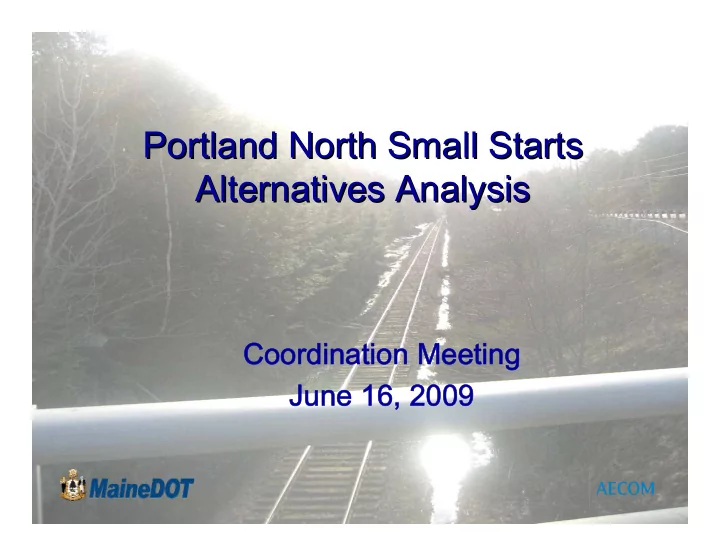

Portland North Small Starts Portland North Small Starts Alternatives Analysis Alternatives Analysis Coordination Meeting June 16, 2009
Agenda Agenda Introductions Summary of Project Station Issues (Feedback) Summary of Small Starts Process Preliminary Screening Criteria (Feedback) Other Issues
Overview of Alternatives Overview of Alternatives Three service alternatives – Yarmouth – Brunswick (Bath) – South Auburn (Lewiston) Three route alternatives: – Saint Lawrence and Atlantic Railway (SLR) – Pan Am Railway – Express Bus Five Portland terminal alternatives: – Bayside (SLR) – India Street (SLR) – Union Station (Pan Am) – Center Street (Pan Am) – Monument Square (Express Bus)
Brunswick Service Brunswick Service SLA Pan Am Express Bus Brunswick Bath Brunswick Bath Brunswick Freeport Freeport Freeport Yarmouth Yarmouth Jct Yarmouth (Exit 15) (Exit 15) Cumberland Falmouth Falmouth (Exit 53) Falmouth (Exit 10) (Exit 10) Union Station Monument Square India Street Center Street Bayside
Yarmouth Service Yarmouth Service SLR Pan Am Express Bus Yarmouth Yarmouth Yarmouth Jct (Exit 15) (Exit 15) Cumberland Falmouth Falmouth Falmouth (Exit 10) (Exit 53) (Exit 10) Union Station Bayside India Monument Center Street Square Street
Bayside Monument Square PULSE Portland India Street Transportation Center Center Street Union Station Publicly Owned Pan Am Track to Rebuild
Express Bus Terminal Option Bayside Monument Square PULSE Portland India Street Transportation Center Center Street. Union Station
Yarmouth Service Statistics Yarmouth Service Statistics 22 Roundtrips per Weekday Service Headways – 30 minute peak – 60 minute offpeak First trip arrives Portland: 6:45 AM Last trip departs Portland: 10:55 PM
SLR Service to Yarmouth SLR Service to Yarmouth Stops – Yarmouth – Falmouth Yarmouth (Exit 15) – Portland (Bayside or India Street) Yarmouth to Bayside: 17 minutes Yarmouth to India Street: 18 minutes Falmouth (Exit 10) 9.3 miles to Bayside 10.1 miles to India Street Required Infrastructure Upgrades – Reconstruct Union Branch – Build new bridge over Back Bayside Cove India Street – Rebuild SLR Main
SLA Route SLA Route Yarmouth Station I- -295 (Exit 295 (Exit Yarmouth Station I 15) 15) Conveniently located of I-295 at Exit 15 ~ 1 mile south of Yarmouth Center Station near MDOT property
I-295 I-295 Southbound On-Ramp Rte 1
Pan Am Service to Yarmouth Pan Am Service to Yarmouth Yarmouth Jct Yarmouth Stops – Yarmouth Jct – Cumberland – Falmouth Cumberland – Portland ( Union Station or Center Street ) Yarmouth Jct to Union Station: 20 min Yarmouth Jct to Center Street: 26 min Falmouth (Exit 53) 13.5 miles to Union Station 15.6 Miles to Center Street Required Infrastructure Upgrades – Upgrades to Pan Am Freight Main and Commercial Street Union Station Center Street
Pan Am Route Pan Am Route Yarmouth Jct Station Yarmouth Jct Station ~ 1 mile north of downtown Yarmouth ~0.2 miles east of Yarmouth Junction Land for station development Proposed Station Site Facing East Yarmouth Junction Royal Junction I-95 On Ramps Cumberland Center Yarmouth Center Yarmouth (Exit 15) Cumberland
Yarmouth Center East Elm Street Freeport and Brunswick Yarmouth Jct
Express Bus Service to Yarmouth Express Bus Service to Yarmouth Stops Yarmouth – Yarmouth (Exit 15) – Falmouth – Monument Square 10.4 miles to Monument Square Falmouth Operate on shoulders where available (Exit 10) Downtown Distribution loop Monument Square
Express Bus Express Bus Yarmouth I- -295 (Exit 15) 295 (Exit 15) Yarmouth I Conveniently located off I-295 at Exit 15 Park-n-Ride Stop Near MDOT property
Rte 1 Northbound Southbound Stop Stop I-295 Southbound On-Ramp I-295
Small Starts Summary Small Starts Summary Capital costs associated with new fixed guideway systems, extensions, and bus corridor improvements Requests under $75 million and total project costs must be under $250 million In addition, Small Starts eligible if: – (a) meet the definition of a fixed guideway for at least 50 % of the project length in the peak period – (b) be a new fixed guideway project, or
Small Starts (cont.) Small Starts (cont.) – (c) be new corridor-based bus project with all of the following minimum elements : • Substantial transit stations • Traffic signal priority/pre-emption, to the extent, if any, that there are traffic signals on the corridor • Low-floor vehicles or level boarding • Branding of the proposed service • 10 minute peak/15 minute off peak headways or better while operating at least 14 hours per weekday
Small Starts Funding (FY10) Small Starts Funding (FY10) $174 Million for 16 projects Maximum grant $54.5 Million
Small Starts Criteria Small Starts Criteria Overall Project Rating Project Local Financial Justification Commitment Criteria Cost Land Use Other Factors – Effectiveness Economic Development
FTA Small Starts Evaluation Criteria FTA Small Starts Evaluation Criteria Cost Effectiveness (which is a combined measure of annual travel time savings and annualized cost) Total Cost compared to State and Local Financial Capacity – Capital cost (including highway or rail improvements including railroad bridge costs) – Operational cost Transportation Measures (which would be roughly proportional to vehicular emissions) – Level of Service – Total System Vehicle Miles Traveled – Total System Vehicle Hours Traveled Land Use – Existing Land Use Patterns – Transit supportive plans and policies – Performance and impact of these policies
Small Starts Ratings Small Starts Ratings New project justification ratings for FY 2010 KEY DRIVERS – 30% Cost Effectiveness – 30% Land Use – 30% Economic Development
Preliminary Screening Criteria Preliminary Screening Criteria – Cost (higher weighting) – Leveraging existing Investments – Land use/economic development benefits – Ridership – Service to transit-dependent population and social equity – Impact on highway congestion – Support of Maine’s Sensible Transportation Policy Act (STPA) – Availability of right-of-way – Impact of grade crossings – Others?
Next Steps Next Steps Phase 1 Alternatives Evaluation Selection of Alternatives for Phase 2 Evaluation Phase 2 Evaluation – Further Development of Alternatives Selection of Preferred Alternative Small Starts Assessment
Recommend
More recommend